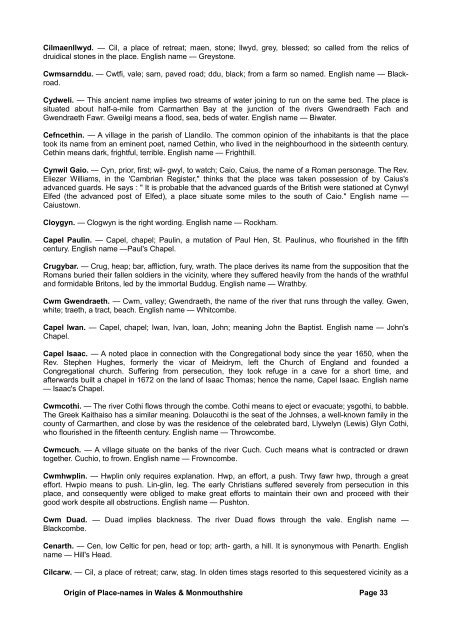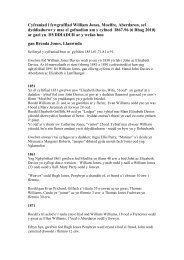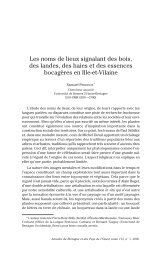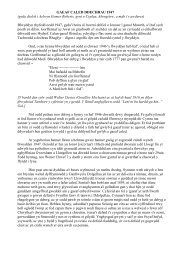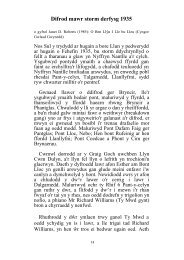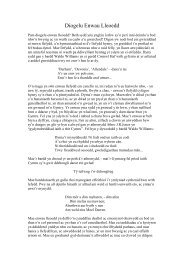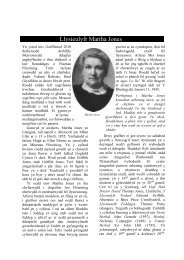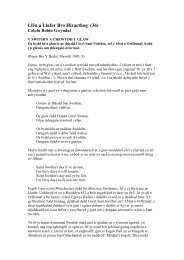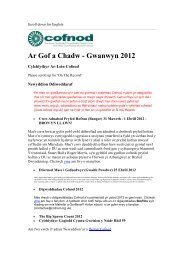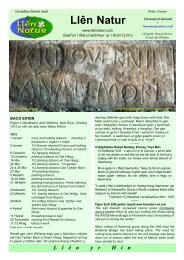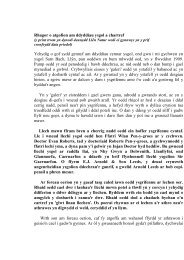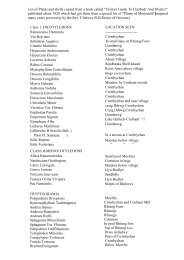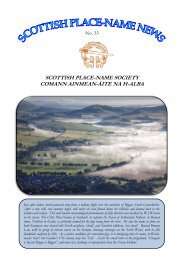Cilmaenllwyd. — Cil, a <strong>place</strong> <strong>of</strong> retreat; maen, stone; llwyd, grey, blessed; so called from <strong>the</strong> relics <strong>of</strong>druidical stones <strong>in</strong> <strong>the</strong> <strong>place</strong>. English name — Greystone.Cwmsarnddu. — Cwtfi, vale; sarn, paved road; ddu, black; from a farm so named. English name — Blackroad.Cydweli. — This ancient name implies two streams <strong>of</strong> water jo<strong>in</strong><strong>in</strong>g to run on <strong>the</strong> same bed. The <strong>place</strong> issituated about half-a-mile from Carmar<strong>the</strong>n Bay at <strong>the</strong> junction <strong>of</strong> <strong>the</strong> rivers Gwendraeth Fach <strong>and</strong>Gwendraeth Fawr. Gweilgi means a flood, sea, beds <strong>of</strong> water. English name — Biwater.Cefnceth<strong>in</strong>. — A village <strong>in</strong> <strong>the</strong> parish <strong>of</strong> Ll<strong>and</strong>ilo. The common op<strong>in</strong>ion <strong>of</strong> <strong>the</strong> <strong>in</strong>habitants is that <strong>the</strong> <strong>place</strong>took its name from an em<strong>in</strong>ent poet, named Ceth<strong>in</strong>, who lived <strong>in</strong> <strong>the</strong> neighbourhood <strong>in</strong> <strong>the</strong> sixteenth century.Ceth<strong>in</strong> means dark, frightful, terrible. English name — Frighthill.Cynwil Gaio. — Cyn, prior, first; wil- gwyl, to watch; Caio, Caius, <strong>the</strong> name <strong>of</strong> a Roman personage. The Rev.Eliezer Williams, <strong>in</strong> <strong>the</strong> 'Cambrian Register," th<strong>in</strong>ks that <strong>the</strong> <strong>place</strong> was taken possession <strong>of</strong> by Caius'sadvanced guards. He says : " It is probable that <strong>the</strong> advanced guards <strong>of</strong> <strong>the</strong> British were stationed at CynwylElfed (<strong>the</strong> advanced post <strong>of</strong> Elfed), a <strong>place</strong> situate some miles to <strong>the</strong> south <strong>of</strong> Caio." English name —Caiustown.Cloygyn. — Clogwyn is <strong>the</strong> right word<strong>in</strong>g. English name — Rockham.Capel Paul<strong>in</strong>. — Capel, chapel; Paul<strong>in</strong>, a mutation <strong>of</strong> Paul Hen, St. Paul<strong>in</strong>us, who flourished <strong>in</strong> <strong>the</strong> fifthcentury. English name —Paul's Chapel.Crugybar. — Crug, heap; bar, affliction, fury, wrath. The <strong>place</strong> derives its name from <strong>the</strong> supposition that <strong>the</strong>Romans buried <strong>the</strong>ir fallen soldiers <strong>in</strong> <strong>the</strong> vic<strong>in</strong>ity, where <strong>the</strong>y suffered heavily from <strong>the</strong> h<strong>and</strong>s <strong>of</strong> <strong>the</strong> wrathful<strong>and</strong> formidable Britons, led by <strong>the</strong> immortal Buddug. English name — Wrathby.Cwm Gwendraeth. — Cwm, valley; Gwendraeth, <strong>the</strong> name <strong>of</strong> <strong>the</strong> river that runs through <strong>the</strong> valley. Gwen,white; traeth, a tract, beach. English name — Whitcombe.Capel Iwan. — Capel, chapel; Iwan, Ivan, loan, John; mean<strong>in</strong>g John <strong>the</strong> Baptist. English name — John'sChapel.Capel Isaac. — A noted <strong>place</strong> <strong>in</strong> connection with <strong>the</strong> Congregational body s<strong>in</strong>ce <strong>the</strong> year 1650, when <strong>the</strong>Rev. Stephen Hughes, formerly <strong>the</strong> vicar <strong>of</strong> Meidrym, left <strong>the</strong> Church <strong>of</strong> Engl<strong>and</strong> <strong>and</strong> founded aCongregational church. Suffer<strong>in</strong>g from persecution, <strong>the</strong>y took refuge <strong>in</strong> a cave for a short time, <strong>and</strong>afterwards built a chapel <strong>in</strong> 1672 on <strong>the</strong> l<strong>and</strong> <strong>of</strong> Isaac Thomas; hence <strong>the</strong> name, Capel Isaac. English name— Isaac's Chapel.Cwmcothi. — The river Cothi flows through <strong>the</strong> combe. Cothi means to eject or evacuate; ysgothi, to babble.The Greek Kaithaiso has a similar mean<strong>in</strong>g. Dolaucothi is <strong>the</strong> seat <strong>of</strong> <strong>the</strong> Johnses, a well-known family <strong>in</strong> <strong>the</strong>county <strong>of</strong> Carmar<strong>the</strong>n, <strong>and</strong> close by was <strong>the</strong> residence <strong>of</strong> <strong>the</strong> celebrated bard, Llywelyn (Lewis) Glyn Cothi,who flourished <strong>in</strong> <strong>the</strong> fifteenth century. English name — Throwcombe.Cwmcuch. — A village situate on <strong>the</strong> banks <strong>of</strong> <strong>the</strong> river Cuch. Cuch means what is contracted or drawntoge<strong>the</strong>r. Cuchio, to frown. English name — Frowncombe.Cwmhwpl<strong>in</strong>. — Hwpl<strong>in</strong> only requires explanation. Hwp, an effort, a push. Trwy fawr hwp, through a greateffort. Hwpio means to push. L<strong>in</strong>-gl<strong>in</strong>, leg. The early Christians suffered severely from persecution <strong>in</strong> this<strong>place</strong>, <strong>and</strong> consequently were obliged to make great efforts to ma<strong>in</strong>ta<strong>in</strong> <strong>the</strong>ir own <strong>and</strong> proceed with <strong>the</strong>irgood work despite all obstructions. English name — Pushton.Cwm Duad. — Duad implies blackness. The river Duad flows through <strong>the</strong> vale. English name —Blackcombe.Cenarth. — Cen, low Celtic for pen, head or top; arth- garth, a hill. It is synonymous with Penarth. Englishname — Hill's Head.Cilcarw. — Cil, a <strong>place</strong> <strong>of</strong> retreat; carw, stag. In olden times stags resorted to this sequestered vic<strong>in</strong>ity as aOrig<strong>in</strong> <strong>of</strong> Place-<strong>names</strong> <strong>in</strong> Wales & Monmouthshire Page 33
<strong>place</strong> <strong>of</strong> refuge; hence <strong>the</strong> name. English name — Stagham.Cilcwm. — The name signifies a sequestered vale. English name — Glenham.Ceryg Sawdde. — A village near Llangattock derives its name from <strong>the</strong> river Sawdde that flows through it.One <strong>of</strong> <strong>the</strong> <strong>in</strong>habitants assured us that <strong>the</strong> first row <strong>of</strong> houses <strong>in</strong> <strong>the</strong> village were built <strong>of</strong> stones conveyedfrom <strong>the</strong> river Sawdde ; hence <strong>the</strong> name. English name — Riverstone.Cenol. — The name, which signifies " middle," was given to this hamlet because it comprises <strong>the</strong> middle part<strong>of</strong> <strong>the</strong> parish <strong>of</strong> Llansawyl. English name — Midham.Cwmaman. — Cwm, narrow vale; Aman, <strong>the</strong> name <strong>of</strong> <strong>the</strong> river that flows through it. Aman is a compound <strong>of</strong>ami, many, <strong>and</strong> an or a<strong>in</strong>, which implies waters; hence <strong>the</strong> name means a river <strong>of</strong> many sources. Englishname — Aquaton.Dafen. — From <strong>the</strong> river Dafen, which flows through <strong>the</strong> <strong>place</strong>. Some th<strong>in</strong>k <strong>the</strong> name is a contraction <strong>of</strong> dwrafon,river water, so called to dist<strong>in</strong>guish it from <strong>the</strong> sea-water, which is near <strong>the</strong> <strong>place</strong>. We are <strong>in</strong>duced toderive it from taf-a<strong>in</strong>, <strong>the</strong> spread<strong>in</strong>g water - Tafwys, <strong>the</strong> Thames, signifies <strong>the</strong> same. English name —Spreadwater.Dyffryn Ceidrych. — Dyffryn, a valley; cei-caitir clear, fair, beautiful; drych, aspect, sight; <strong>the</strong> name Dyffrynsignifies a valley <strong>of</strong> beautiful sceneries. Some th<strong>in</strong>k that <strong>the</strong> valley was named after Ce<strong>in</strong>drych, a daughter -<strong>of</strong> Brychan. English name — Fairview Vale.Edw<strong>in</strong>sford. — A semi-translation <strong>of</strong> <strong>the</strong> Welsh name, Rydodyn. Rhyd, ford; odyn, kiln; signify<strong>in</strong>g a ford near<strong>the</strong> kiln. Some th<strong>in</strong>k it is a translation <strong>of</strong> Rhyd Edwyn.Fel<strong>in</strong>wen. — This village takes its name from an old mill called Fel<strong>in</strong>wen, white mill, which is still <strong>in</strong> <strong>the</strong><strong>place</strong>. English name — Whitemill.Ferry Side. — A pretty village near <strong>the</strong> mouth <strong>of</strong> <strong>the</strong> river Towy, where passengers ferry over <strong>in</strong> boats to <strong>the</strong>opposite village, Llanstephan; hence <strong>the</strong> name.Goytrey. — A mutation <strong>of</strong> coed, wood, <strong>and</strong> tre, a <strong>place</strong>. English name — Woodham.Gwynfe. — Gwyn, white, blessed; fe-fai, an <strong>in</strong>flection <strong>of</strong> mat, a pla<strong>in</strong>. Gwynfa is <strong>the</strong> Welsh for Paradise.English name — Blissham.Hengoed. — A compound <strong>of</strong> hen, aged, <strong>and</strong> coed, so called from <strong>the</strong> abundance <strong>of</strong> ancient <strong>and</strong> large forests<strong>of</strong> wood that once adorned <strong>the</strong> district. English name — Oldwood.Hyreth. — A corruption <strong>of</strong> hiraeth, long<strong>in</strong>g, earnest desire, or, perhaps, a mutation <strong>of</strong> hyriaeth, a shock, aconcussion. English name — Shockham.Johnstown. — A small village near Carmar<strong>the</strong>n town named <strong>in</strong> honour <strong>of</strong> Mr. John Jones, Ystrad.Laugharne. — The old Welsh <strong>names</strong> are Talycoran, Abercoran, Tal-Llacharn. Tal, end; y, <strong>the</strong>; Coran, <strong>the</strong>name <strong>of</strong> <strong>the</strong> river that f<strong>in</strong>ishes its <strong>in</strong>dividual course by flow<strong>in</strong>g <strong>in</strong>to <strong>the</strong> river Taf. Abercoran means <strong>the</strong> same.Some derive <strong>the</strong> present name from Field-Marshal W Laugharne, but we are <strong>in</strong>cl<strong>in</strong>ed to th<strong>in</strong>k it is anAnglicized form <strong>of</strong> Llacham or Talycoran. Coran is an abbreviation <strong>of</strong> Corafon. a rivulet. English name —Streammouth.Llangeler. — The church was dedicated to St. Celert, who flourished <strong>in</strong> <strong>the</strong> fifth century. St. Celert's well isnear <strong>the</strong> church. English name — Celerton.Llangadog. — The church was dedicated to St. Cadoc y a martyr who flourished <strong>in</strong> <strong>the</strong> fifth century, <strong>and</strong>died <strong>in</strong> Brittany. English name — Cadocton.Llanfrynach. — The church was dedicated to St.. Brynach, whose history, accord<strong>in</strong>g to some, is marked bysomewhat remarkable <strong>in</strong>cidents. English name — Bernard.Orig<strong>in</strong> <strong>of</strong> Place-<strong>names</strong> <strong>in</strong> Wales & Monmouthshire Page 34
- Page 1 and 2: HANDBOOK OF THE ORIGIN OF PLACE-NAM
- Page 3 and 4: § § § § §The Author begs to st
- Page 5 and 6: pitiful cries of the railway offici
- Page 7 and 8: Bishop Percy says that "in England,
- Page 9 and 10: The city of Chester is still popula
- Page 11 and 12: There's Cumwhitton, Cumwhinton, Cum
- Page 13 and 14: Llwyn in its primary' sense means a
- Page 15 and 16: PLACE-NAMES IN WALES.Wales. — The
- Page 17 and 18: Church are generally dedicated to e
- Page 19 and 20: think he was a contemporary of St.
- Page 21 and 22: Rhosbeirio. — Rhos, a moor, a dry
- Page 23 and 24: of Brecknock," states that this vic
- Page 25 and 26: Cam cnwir ef Cwmdu,Cwm gwyn yw & n
- Page 27 and 28: Penderyn. — A corruption probably
- Page 29 and 30: Ardudwy. — Ar, upon or above; tud
- Page 31 and 32: to mark its pre-eminence over the o
- Page 33 and 34: Some think that eirw is a corruptio
- Page 35: present form — Caerfyrddin.Abergw
- Page 39 and 40: Llansawyl. — The church was dedic
- Page 41 and 42: eject. The village took its name fr
- Page 43 and 44: house, and attempted to kill an inf
- Page 45 and 46: Gwydir. — Prima facie one may tak
- Page 47 and 48: Nefyn. — The church was probably
- Page 49 and 50: DENBIGHSHIRE.Anglicized form of Din
- Page 51 and 52: Llangollen. — From Collen, a sain
- Page 53 and 54: hands into their pockets to pay a c
- Page 55 and 56: Cefn. — The name signifies a ridg
- Page 57 and 58: Maesgarmon. — Named in honour of
- Page 59 and 60: Abertridwr. — Tridwr, three water
- Page 61 and 62: it is said, was originally built by
- Page 63 and 64: Cwmllynfell. — Cwm, a narrow vale
- Page 65 and 66: Gwarycaeau. — Gwdr, the nape of t
- Page 67 and 68: means a cultivated region, a vale,
- Page 69 and 70: Penrhiwfer.- Pen, head, top; rhiw,
- Page 71 and 72: Port Talbot. — So called in 1835
- Page 73 and 74: Trealaw. — This appellation was g
- Page 75 and 76: Aberdyfi. — So called from its si
- Page 77 and 78: Llanddwywe. — From Dwywau, a desc
- Page 79 and 80: Crickhowell and some in the directi
- Page 81 and 82: Griffithstown. — This village was
- Page 83 and 84: and gwy, water. Treiddiod troth tna
- Page 85 and 86: derive Tintern from din, fortified
- Page 87 and 88:
Caersws. — It appears that the Ro
- Page 89 and 90:
English name — Ervylton.Llanymech
- Page 91 and 92:
Angle. — Probably from the angle-
- Page 93 and 94:
Gellyswick. — Another hybrid. Gel
- Page 95 and 96:
that the two rivers in their flowin
- Page 97 and 98:
ecame the bishop of the see, and wa
- Page 99 and 100:
earth formerly stood on a summit on
- Page 101 and 102:
Pilleth. — A corruption of pwll,
- Page 103 and 104:
Howells, Rev. J., Mountain AshHowel
- Page 105 and 106:
Williams, D., PenywernWilliams, Rev


